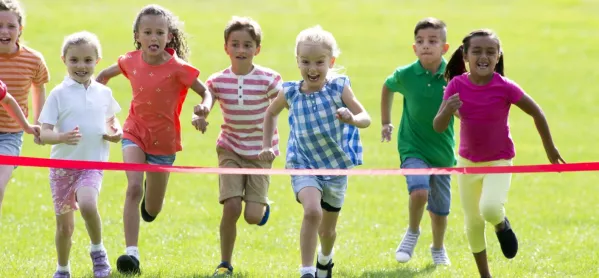Children who do more physical activity are likely to have stronger self-control, a study suggests.
This can, in turn, affect academic achievement, according to researchers at the University of Cambridge’s Faculty of Education.
The study’s authors suggest that giving every child the opportunity to take part in certain types of physical activity, like swimming and ball sports, could help to close the achievement gap between the wealthy and the less advantaged.
And they have warned against limiting physical activities in schools in an attempt to ensure that pupils catch up academically after Covid-19.
Quick read: Why exercise is crucial to learning
Research: Most parents value pupil wellbeing above exam results
Covid: Teachers coached to think like athletes during lockdown
Researchers analysed data from more than 4,000 children in England, captured at three stages during childhood and adolescence: ages 7, 11 and 14.
Covid catch-up: The importance of sport and physical activity in schools
This subset of data covering pupils’ physical activity came from the Millennium Cohort Study, which is following the lives of around 19,000 young people born between 2000 and 2002 in the UK.
Research indicates that the pattern of physical activity indirectly influencing progress at school, by boosting self-control, is particularly pronounced among disadvantaged children.
This may, in part, be because less-advantaged children often have fewer opportunities to participate in organised recreation and sports, and therefore experience stronger benefits when they do so, according to the study’s authors.
Fotini Vasilopoulos, who led the study while a research student at Cambridge’s Faculty of Education, said: “Research examining the links between physical activity and attainment has produced mixed findings, but there is a positive, indirect relationship because of the impact on mental processes like self-control.
“This may be particularly important for children from families who find it harder to access sports clubs or other forms of physical activity outside school.
“The attainment gap is a really complex problem, but we know that some of it is linked to less-advantaged children having poor self-regulation skills early in childhood.
“Physical activities that help them to do things like focus on a task or maintain attention could be part of the way to bridge that gap.”
Co-author Dr Michelle Ellefson, reader in cognitive science at the Faculty of Education, said: “In the context of Covid, in particular, there may be a real temptation to encourage schools to maximise classroom time to stop children falling behind.
“This study is saying, ‘Think again,’ because playtime and PE lessons benefit the mind in ways that children really need in order to do their best.”
Activities that influence emotional control, such as games that involve co-operation, could be particularly important during early childhood, the research indicates.
The authors suggest that schools could build links with sports clubs to create targeted programmes for children experiencing early disadvantage.
“Even giving children less-structured opportunities to run around outside could be of real developmental importance,” said Dr Ellefson.
“We really need to ensure that physical activity does not become an area schools feel they can legitimately sacrifice to drive up academic attainment.
“It has a crucial part to play.”
The research is published in the journal PLOS One.




